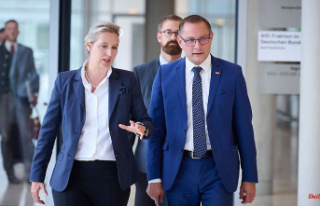The protective shield against high energy prices is also a "double boom" in the heads of many EU countries. They fear that as a result they will fall further behind rich Germany. They demand a European solution with common debts. Finance Minister Lindner reacted almost allergically.
Federal Finance Minister Christian Lindner has rejected demands from the EU Commission to finance an emergency aid program in the energy crisis through joint debts. The EU cannot transfer the instruments of the corona pandemic "one to one" to the current situation, said the FDP leader at the EU finance ministers' meeting in Luxembourg. "This crisis is very different from the corona pandemic."
In the Corona crisis, the EU set up a reconstruction fund of 750 billion euros. It is financed by community debt taken on by the EU Commission. In 2020, the federal government approved joint debt for the first time and emphasized that it was a one-time exception. Joint debts mean that Germany is also liable for other EU members. In contrast, Lindner now advocated joint gas purchases. "We need to make progress on joint gas purchasing," he said.
EU Economics Commissioner Paolo Gentiloni, on the other hand, once again called for a European solution to the energy crisis. "If we want to avoid fragmentation and deal with these crises, I think we need a higher level of solidarity and we need to introduce other common tools." He cited the Sure program as an example, which made short-time work programs possible during the pandemic through cheap EU loans. However, Lindner does not currently consider proposals based on the Sure program to be suitable, as he clarified in Luxembourg.
Gentiloni and Internal Market Commissioner Thierry Breton had campaigned for "European instruments" on a debt basis in the "Frankfurter Allgemeine Zeitung" this Tuesday. There are "Member States that do not have the same budgetary leeway as Germany" and therefore may not be able to support their consumers and the economy equally, the text says. "More than ever we must avoid distorting competition in the internal market," warn the two commissioners. "We must not start a subsidy race, thus challenging the principles of solidarity and unity that underpin the success of our European project."
Germany had previously received a lot of criticism from other EU countries and also from the Commission for the 200 billion euro defense shield, which Chancellor Olaf Scholz had described as a "double boom". It is intended to protect households and companies from high energy prices. Since Russia hardly supplies any more gas to Europe, gas and electricity prices have risen sharply. It was now feared that Germany could use the relief package to gain an advantage over other countries.
Specifically, concerns are expressed that Germany supports its companies on a scale that smaller countries cannot compete with. Countries like Italy, Spain or France are therefore calling for joint measures - a European gas price cap is also under discussion, which the federal government has so far been skeptical about. The EU states had already agreed on joint gas purchases in March, but a joint coordination platform has not yet provided much concrete information.
Lindner said in Luxembourg that many had "not yet noticed" that the 200 billion defense shield was aimed at the period up to 2024. The EU Commission has "not yet fully recognized" that it is not just a measure for 2022.












